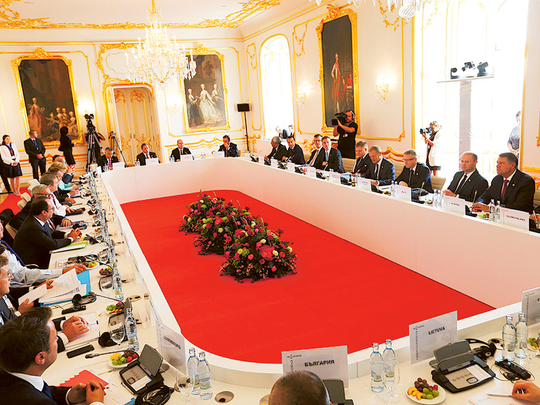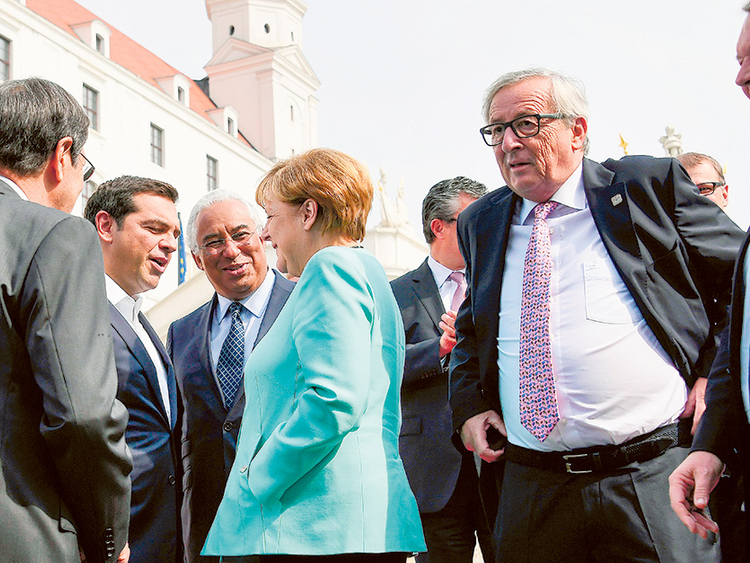
Bratislava: German Chancellor Angela Merkel warned on Friday that the EU faces a “critical situation” post-Brexit, as leaders met in Bratislava without Britain to plot a course for the future.
The 27 leaders — minus British Prime Minister Theresa May — say they want to show they can respond to the challenges of mass migration, security, globalisation and a stuttering economy.
Merkel said the bloc simply had to improve. Her influence as leader of the EU’s biggest economy has been undermined by her unpopular decision to open Germany’s doors last year to nearly a million refugees.
“We are in a critical situation. We have to show with our actions that we can get better,” Merkel said as she arrived at the special summit, held in the Slovak capital’s towering castle overlooking the River Danube.
“I hope that Bratislava shows that we want to work together and we want to solve the problems which we have in Europe,” she added.
French President Francois Hollande, the other half of the EU’s “power couple” with Merkel, was equally blunt about the task ahead.
“We face either break-up, weakening — or we choose the opposite, together giving Europe a purpose,” said Hollande, who has made common cause with Berlin on boosting EU defence cooperation.
EU President Donald Tusk had warned on the eve of the summit that leaders must “have a sober and brutally honest assessment of the situation.”
The EU leaders have said they want to launch a “Bratislava Process” of reforms at this summit, to be further discussed in Malta early next year and then agreed in Rome in March 2017 to mark the 60th anniversary of the founding of the EU.
The leaders, who were greeted by soldiers in bright blue uniforms and ceremonial plumes, held a first round of talks in the castle then lunched on a river cruise on the Danube to informally discuss Brexit.
However, the EU leaders will not hold formal talks in Bratislava on the Brexit negotiations as they are still impatiently waiting for Britain to trigger the two-year divorce process.
Boosting defence cooperation is a key issue for the leaders who hope it will give them something to rally around after deadly terror attacks in France and Belgium.
European Commission chief Jean-Claude Juncker this week proposed an EU defence headquarters and a common defence force, both ideas that Britain had previously nixed because they might overlap with Nato.
But cracks in the union are evident everywhere.
The migration crisis is the most divisive issue, with many Eastern European leaders blaming Merkel for opening the continent’s doors to refugees from conflict in Syria and elsewhere.
Slovak Prime Minister Robert Fico, who is hosting the summit, said all wanted unity but a “very honest” exchange of views was needed to make that possible.
Yet Fico himself has been a divisive figure on the migrant issue, refusing to allow in a “single Muslim” and taking the EU’s refugee sharing policy to court. His views are shared by other Eastern European leaders.
In a further sign of the tensions over migration, Luxembourg’s foreign minister this week called for Hungary to be suspended from the EU for treating refugees from war-torn Syria and other countries like “animals”.
Meanwhile thrice-bailed out Greece last week gathered mostly centre and centre-left southern EU leaders in Athens to urge their northern counterparts to share more of the migrant burden and ease up on austerity.
The EU, a bloc of 500 million people, has been under siege since the 2008 global financial crash threw millions out of work and austerity policies undercut its claim that it alone guaranteed a better economic future.
Russia’s intervention in Ukraine, the migrant crisis and deadly Islamic State attacks in France and Belgium have eroded confidence that the EU can protect its citizens.
Britain meanwhile is left out in the cold, with the Times newspaper saying it was being treated as a “pariah state” and should have a say on issues which still affect it while it remains in the bloc.













